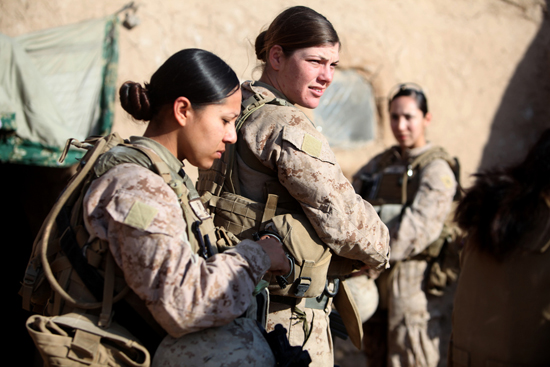Combat Stress: Women as Resilient as Men
BU study first of its kind

War is hell, but women soldiers may be no more vulnerable than men to its stresses. That’s the surprising conclusion of a study led by the School of Medicine of veterans returning from the Afghanistan and Iraq wars.
The researchers say their findings differ from broader studies suggesting females have a heightened vulnerability to trauma. They surveyed 340 women and 252 men who had returned from deployment within the previous year, quizzing them about any symptoms of depression, substance abuse, post-traumatic stress disorder, and other mental health impairment.
“While women are still officially barred from direct ground combat positions in the U.S. military, they serve in a variety of positions that put them at risk for combat exposure,” the researchers write in their paper, which currently appears online in the Journal of Abnormal Psychology. “Women’s risk for combat is compounded by the enemy’s increased use of guerrilla warfare tactics in recent wars. As of 2009, more than 750 women had been wounded or killed in action” during Operation Iraqi Freedom and Operation Enduring Freedom, which includes the Afghanistan war and some other anti-terrorism efforts.
Previous research has looked at the effects of “all types of potentially traumatic events” on women, such as sexual assault and car accidents, says study lead author Dawne Vogt, a MED associate professor of psychiatry and a researcher at the National Center for Post-Traumatic Stress Disorder in the VA Boston Healthcare System. In such noncombat traumas, Vogt says, “there’s kind of this consistent finding that women are worse off” than men. Yet her study found no such disparity in trauma from combat.
She and her colleagues cite speculation by others that the threat from combat is so persistent and overwhelming that it affects both genders equally. Women soldiers also have received improved training in recent years, according to the study.
“Regardless of the cause,” the study concludes, “these findings have substantial implications for military policy, as they call into question the commonly held belief that women may be more vulnerable to the negative effects of combat exposure than men.” A congressionally created commission has recommended ending the ban on women in combat.
The study asked subjects about other stressors besides combat exposure: postbattle experiences such as handling human remains, fear for one’s safety and other pressures from living in a war zone, sexual harassment or assault during deployment, and predeployment exposure to stress. While the women reported slightly less exposure to most combat-related stressors, they recounted greater exposure to sexual harassment and predeployment stress.
Conceding several uncertainties in their work, the researchers suggest follow-up studies. Postdeployment symptoms may increase over time, they write, and future surveys should include vets who are more than a year out from returning from deployment. Vogt says she will follow up on the study with data she expects to collect on the mental health of veterans two to three years after their deployment ends.
The researchers write that they’re unaware of any similar study measuring combat stress effects between men and women. Among the study coauthors are School of Public Health researchers Mark Glickman, Susan Eisen, Rani Elway, and Mari-Lynn Drainoni.
Rich Barlow can be reached at barlowr@bu.edu.

Comments & Discussion
Boston University moderates comments to facilitate an informed, substantive, civil conversation. Abusive, profane, self-promotional, misleading, incoherent or off-topic comments will be rejected. Moderators are staffed during regular business hours (EST) and can only accept comments written in English. Statistics or facts must include a citation or a link to the citation.